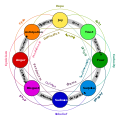
| Part of a series on |
| Emotions |
|---|
  |
Joy is the state of being that allows one to experience feelings of intense, long-lasting happiness and contentment of life. It is closely related to, and often evoked by, well-being, success, or good fortune. [1] Happiness, pleasure, and gratitude are closely related to joy but are not identical to it. [2]
